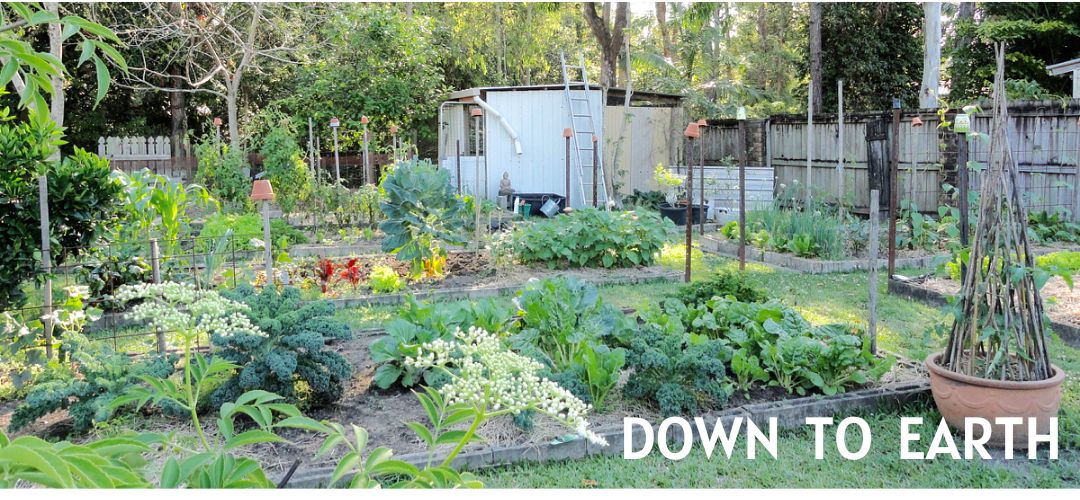There seems to have been a sharp rise in the number of products labelled "organic" on supermarket shelves in the past couple of years. Often I am asked if the weekly shopping should include organic fruit, vegetables, meat and chicken, as well as the newer products we're seeing now - butter, cheese, wine and tinned goods. I don't want to advise anyone as to what they should buy. We're all so different, we have different meeds, tastes and incomes and we all know that "organic" comes at a price.
I know I'm lucky to live in Australia and to pinpoint it more closely, in the hinterland of the Sunshine Coast. Not only do we have a beautiful climate and adequate rainfall here to grow a wide variety of backyard food, year-long, we also have a lot of producers' markets and small local markets. Within a short distance of where I live there is an organic supermarket and butcher and a food co-op with a lot of organic produce such as milk, cheese, grains, flour, dried fruit, chocolate, tea and coffee. Just up the road we have a dairy and whenever I drive past on that back road, I see those healthy goats and Guernsey cows roaming freely over rolling hills. It's not organic but it's local and fresh.
So for me, it's not a question of where do I find it? - it's easy to find. The question here is do I buy it?
Like most of us, I didn't really question "organic"when I first came to this way of living. To me then, it was premium and what I wanted to buy. But in the years since, I've thought a lot about what "organic" means and if I should tweak my budget, and go without other things, to buy mainly organic food.
The answer for me now, is no. When I have a choice, I prefer to buy fresh and local.
The term "organic" means different things in different places. Here in Australia, producers apply for organic certification and then have to undergo a series of inspections and, all things going well, they get their certification and operate according to those standards. There are also producers who say they're organic, and might very well be, but are not certified. I think there is a diverse understanding of the term as well. Some people think that organic produce has been grown without the use of fertilisers and insecticides. But there are a number of "natural" fertilisers and a short list of acceptable insecticides used to grow organic produce. We use pyrethrum spray here - it's made from daisies and it's an acceptable insecticide for organic growers. We think of the fruit and vegetables we grow here as being organic but we use homemade fertilisers, Dipel and pyrethrum. They're all seen as organically acceptable but we don't have to follow any standards, we are simply making what we believe are the right choices to produce our own healthy food.
Now when I think of organic food I think not only of the synthetic chemical means of production but also elements that include social factors and logistics as well. Now it's not a question of whether my tomatoes have been sprayed, it's much more than that. Is food 'organic' if the people producing it are paid next to nothing? Is food still 'organic' is it's been flown from one side of the world - from place of production to place of sale? Shouldn't food miles play a part in what is seen as 'organic'? Can I still consider my food 'organic' if my apples, potatoes, onions, or whatever, have been stored for months in a cold room? I have had a shift in thinking and now I don't just rely on a label to tell me something is organic, I also include my own questions about origin, transportation, means of production and the workers who produced it.
When we buy our food, I think we should not only look at the health component, which takes in whether is was grown organically or not, we should also consider how far it's travelled from point of production to our door, how it's packaged, and where that packaging came from. We should consider the means of production and the workers who produced it. 'Organic' means more than chemicals and price. It also means social justice and sustainability.
We need to think about animals slaughtered for our food. I want the eggs and meat I eat to come from creatures that have lived a decent life. I'd rather never eat those products again if it meant I was supporting and helping to perpetuate cruelty in the form of caged poultry, gestation pens or whatever else.
Crikey, it sounds like I'm trying to complicate buying a bag of potatoes and a pork chop but what I'm hoping to do is to start a conversation about how we choose the food we buy. For me, genuine 'free range', fresh and local is premium now and it outweighs organic from another country, or even another state. I know I'm lucky to live where there is a wide variety of healthy food, in addition to our backyard produce, but that variety and choice brings important decision-making with it. I'd love to know your thoughts on this. Do you question how healthy and ecologically-sound organic produce is? Do you buy it if it's from another country? Have you, like me, replaced "organic" with fresh and local? Do you factor in the problem of animal cruelty or transport and food miles? I look forward to reading your comments.







